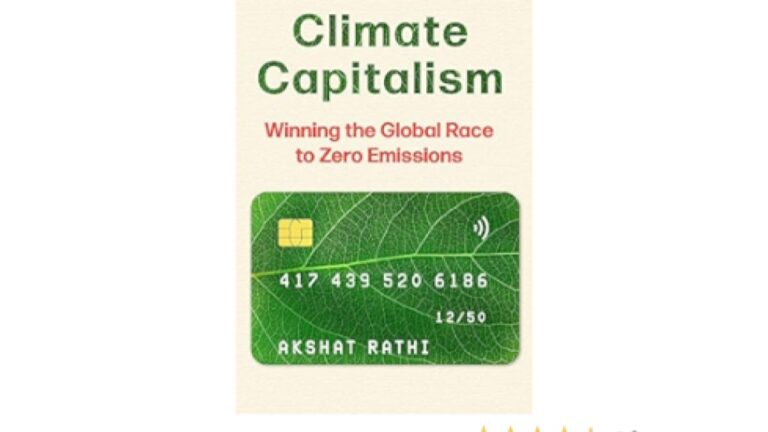Written by Mohit Hira
So many books have been written about climate change that some people wonder if the number of trees that are cut down to produce the mass amounts of paper for these books is itself a contradiction in terms. there is no. Hachette does not reassure me that Akshat Rati's Climate Capitalism: Winning the Global Race to Zero Emissions is printed on recycled paper, but the book itself is Worth picking up, reading, and rereading. But what the publisher did was introduce a clever design element to the cover. Or perhaps the author's younger sister, Surabhi, is credited with “helping me with the cover.” In any case, the 13-digit number indicates the amount of carbon dioxide in the atmosphere as of October 2023. This is a frightening 50% higher than pre-industrial levels. You may even question how it was measured at the time, but the author's tireless efforts to track and record the people who are playing a key role in the fight against climate change – the “unlikely heroes” There's no question about it.
In an almost retrograde way, Rati's work provokes a debate about the potential of leveraging capitalism to address the climate crisis. His optimistic outlook and provocative ideas offer a nuanced perspective, recognizing both the promises and challenges we face.
Without running away from it, the author confronts the contradictions of capitalism, recognizing its profit-driven nature and dependence on capitalism, which is often at odds with the environment.
Along his journey, Rati proposes ambitious solutions that advocate a “green industrial revolution” that leverages markets.
Despite resonance with Rati's vision, skepticism persists. Critics such as Anne Pettifor question the feasibility of aligning profit motives with environmental responsibility. A key concern is whether companies driven by shareholder interests can truly prioritize long-term sustainability over short-term profits, and whether competitive markets can effectively contribute to collective environmental goals. It is centered around.
Recognizing these challenges, Rati advocates for significant government intervention, proposing carbon pricing, green infrastructure investment, and a regulatory framework to guide markets toward sustainable practices. However, concerns have been raised about potential market distortions and the risk of regulatory capture, where special interests manipulate regulations for personal gain.
Rati has great faith in technological advances to reduce the effects of climate change, particularly carbon capture and storage (CCS). However, the scalability and environmental impact of CCS are unproven, creating uncertainty. Investing heavily in untested technology, while promising, comes with the risk of diverting resources from more established solutions.
The fundamental question raised by Rati is whether capitalism itself is the ideal means of dealing with the climate crisis. Some argue that a focus on growth and profits conflicts with the paradigm shift needed for true sustainability. Alternative economic models, such as degrowth and the donut economy, have been proposed to prioritize ecological well-being over permanent expansion.
One of the reasons I picked up this book and rushed through it is because it brings together people who are fighting climate change in a variety of ways, from ReNew Power's Sumant Sinha to Wan Gang, who played a role in EV. is.
Climate capitalism serves as an important starting point for necessary conversations. While recognizing the limitations of our current economic model, Rati urges us to recognize the potential for positive change. Success is not blind faith in the market, but our collective ability to regulate market excesses, drive sustainable innovation, foster global cooperation, and reevaluate our approach to consumption and growth. It depends on
In conclusion, climate capitalism injects optimism into the climate change debate, but it should not be seen as a guaranteed roadmap. The real challenge is to steer capitalism toward a sustainable future and recognize that it is just one piece of a broader puzzle in the race to zero emissions.
Mohit Hira is co-founder of Myriad Communications and venture partner at YourNest Capital Advisors.
Book name: Climate capitalism: winning the global race to zero emissions
author: Akshat Rati
the publisher: hachette
272 pages, 699 rupees


